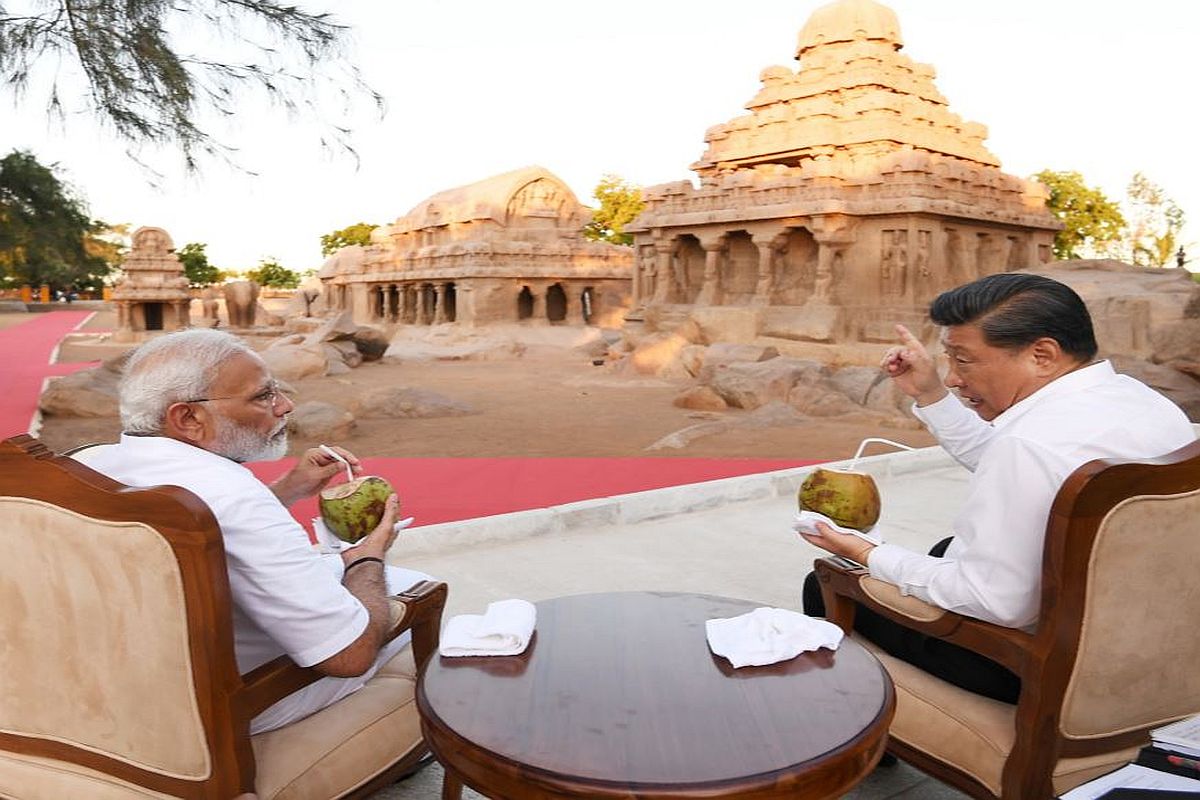K Kavitha questions Modi’s silence on Adani US bribery indictment
Political opponents are arrested without evidence and put on trial for months while Mr Gautam Adani walks free despite repeated and grave allegations, she said.
The one-on-one tete-a-tete between PM Modi and Xi Jinping over dinner on Friday lasted for two-and-a-half hours, well beyond the planned time, and was ‘very open and cordial’.

Prime Minister Narendra Modi and Chinese Xi Jinping at the Pancha Rathas in Mahabalipuram, (Photo: Twitter | @narendramodi)
Prime Minister Narendra Modi and Chinese President Xi Jinping on Friday held detailed discussions on varied issues, including terrorism, increasing radicalisation, enhancing bilateral trade between the two nations and investments, among others.
In a late night press briefing, the government said that India and China agreed that they need to work together to fight “radicalisation and terrorism as common challenges”.
The one-on-one between the two leaders began at 7 pm and ended after 9.30 pm Modi and Xi spent “quality time” during the one-on-one without their aides, while the rest of the delegation had dinner at a separate location, said Foreign Secretary Vijay Gokhale while briefing the media after the talks.
Advertisement
The one-on-one tete-a-tete between Prime Minister Narendra Modi and Chinese President Xi Jinping over dinner on Friday lasted for two-and-a-half hours, well beyond the planned time, and was “very open and cordial”, holding promise of several Confidence Building Measures (CBMs) emerging out of the second informal summit between the two sides.
The two leaders will hold their second round of informal talks on Saturday where they would discuss international and regional issues.
PM Modi and Xi will hold their comprehensive one-on-one meeting at the Taj Fisherman’s Cove Resort and Spa, which will be followed by delegation-level talks. PM Modi will also host President Xi lunch. Both sides will then issue separate statements on outcome of the summit.
The India-China informal summit kicked off on Friday with Prime Minister Narendra Modi giving Xi Jinping a tour of ancient temples in Tamil Nadu’s Mahabalipuram.
At the temple complex, the two leaders had a guided tour of three monuments – Arjuna’s penance, Panch Raths, and the Shore Temple.
The two leaders chatted animatedly as they viewed the imposing seventh century rock-cut cave temples of Mahabalipuram, sipped coconut water and held hands and smiled for the crowds, both looking at ease and enjoying the picturesque and historical setting of the place which is a UNESCO world heritage site.
President Xi Jinping and I saw the marvellous Pancha Rathas.
The five Rathas are examples of monolith rock-cut architecture. The Rathas in this monument include the Dharmaraja Ratha, Bhima Ratha, Arjuna Ratha, Nakula Sahadeva Ratha and Draupadi Ratha. pic.twitter.com/s5xQARmQfC
— Narendra Modi (@narendramodi) October 11, 2019
The two leaders had a detailed discussion on their national visions, and governance priorities. Modi explained that he had received a renewed mandate for economic development, and Xi acknowledged the mandate, saying he looked forward to working with Modi “very closely on all issues for the next 4.5 years”, Gokhale said.
They also talked about other developmental priorities, in particular about trade related issues, economic issues, and were trying to identify issues for investment that the two countries could encourage. They also discussed the trade deficit and the imbalance in trade, which is heavily tilted in China’s favour.
Dressed in the traditional Tamil attire of ‘veshti’ (white dhoti), half-sleeve white shirt and angavastram over his shoulder, PM Modi in the evening welcomed Chinese President Xi Jinping at Mamallapuram, also known Mahabalipuram, for the second informal India-China Summit.
Earlier in the day, the Chinese President was accorded a red-carpet welcome at the Chennai airport with performances by folk dancers and musicians and was received by Tamil Nadu Governor Banwarilal Purohit.
This is the second informal summit between President Xi and Prime Minister Modi. Their first informal meeting at the Chinese city of Wuhan last year resulted in normalisation of the relations between the two countries after the 2017 Doklam standoff.
Advertisement